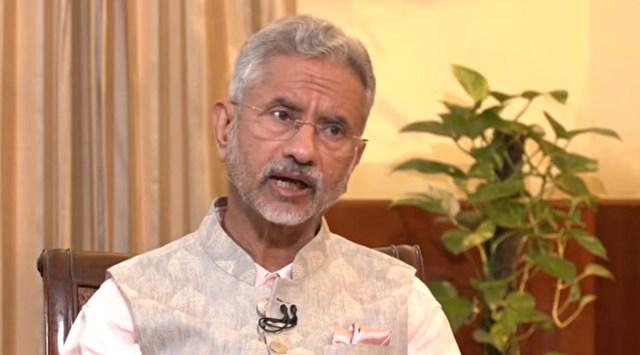Stay updated with the latest - Click here to follow us on Instagram
‘Nothing to do with India’: Jaishankar on Xi, Putin skipping G20 Summit
Jaishankar said that both China and Russia and their respective positions will be reflected by the representatives of the two countries who are present at the G20 Summit. "I think everybody is coming with a great deal of seriousness," he added.
 External Affairs Minister S Jaishankar in an interview with news agency ANI. (Photo: Screengrab from X/@ANI)
External Affairs Minister S Jaishankar in an interview with news agency ANI. (Photo: Screengrab from X/@ANI) Days after Russian President Vladimir Putin and his Chinese counterpart Xi Jinping announced their decision to skip the upcoming G20 Summit in New Delhi, the External Affairs Minister S Jaishankar said, “It has nothing to do with India, whatever decision they make, they know best.”
In an interview to news agency ANI, Jaishankar said that both China and Russia and their respective positions will be reflected by the representatives of the two countries who are present at the G20 Summit.
“…I think, at different points of time in G20, there have been some presidents or prime ministers who, for whatever reason, have chosen not to come themselves. But that country and its position is reflected by whoever is the representative on that occasion… I think everybody is coming with a great deal of seriousness…,” the EAM said.
Xi and Putin will not be attending the G20 summit in New Delhi, slated to be held on September 9 and 10. While the Chinese Foreign Ministry announced that Chinese Premier Li Qiang will attend the summit, Putin told Prime Minister Narendra Modi in a telephonic conversation last week that Russia would be represented by Foreign Minister Sergey Lavrov. While expressing an understanding for Russia’s decision, Modi thanked Putin for Russia’s consistent support to all the initiatives under India’s G20 presidency, the Prime Minister’s Office (PMO) had said.
Xi’s absence comes at a time when India, as the host of the G20 summit and the President of the G20 process for the current year, is in a strained relationship with China. Xi’s absence also means that the consensus on the G20 communique is potentially at risk. Over the last nine months — since December last year when India assumed the Presidency of the G20 — every ministerial and working group level meeting has been divided over one issue: the Russia-Ukraine war.
While Russia and China have objected to the formulation used in the Bali declaration, the West, led by the G7 grouping, has sought to reiterate the Bali declaration. This has divided and polarised the G20 grouping, and a consensus on the Russia-Ukraine war paragraphs have been elusive.
On building consensus during G20 Summit
Speaking on whether Xi’s and Putin’s absences would have an impact on the outcomes of the Summit, the EAM told ANI, “The issues are there, and these issues are not this morning being taken up. There’s a whole gestation period of 8-9 months. Ministers and officials have tried to progress an issue. So this is like a culmination… about 16-18 processes are all coming together to produce a Summit.”
“We are negotiating right now… the clock did not start ticking yesterday. Typically what happens is there’s a ministerial meeting, which produces outcomes… these outcomes are melded together to produce a composite document,” Jaishankar continued to elaborate on the process of negotiation occurring ahead of the global meet.
When questioned about ‘muscle-flexing’ even before the Summit begins as the Russian Foreign Minister pushes for their view on the Ukraine crisis to be included in the G20 declaration, the Minister said, “That may be the way you would characterise it. For me, anybody would try to put across their national position, try to maximise their negotiating position if you would. I think you should wait and see what actually happens in the negotiation and not pre-judge it purely in terms of what may be said on one occasion, and what may be the media interpretation of what was said on one occasion.”
India’s responsibility as host country during G20
On India’s responsibility as a host country during the summit, Jaishankar said, “I don’t think it is just a matter of India seeing something. Today, the expectations of the world are very high in terms of what the G20 is able to produce, and produce in terms of meeting the challenges of the world… The world is waiting.”
“Today, I see it more for India as a responsibility, that we have the responsibility today in a very difficult world. It is difficult in terms of the COVID impact, difficult in terms of conflict impact, in terms of climate impact, in terms of debt, that is one part of it. But it is also difficult politically — there is a very sharp north-south divide. There is an even sharper east-west polarization. So how do you bring people together? How do you find common ground? How do you make everybody understand that we all have a bigger responsibility and therefore please, can we kind of get our act together here, and do what is right by the world,” Jaishankar added.
‘G20 not an arena for power politics’
The EAM, during the interview, denied G20 Summit to be an arena for power politics. “G20 is not the arena for power politics. I am very conscious that diplomacy and international relations is a very competitive exercise. But even in diplomacy, there are occasions when you are competitive, and there are occasions when you are cooperative. G20 is very much a collaborative forum… we are trying to develop an agenda…”
“If you look at [the issue of] resources for green development, sustainable growth, plastics, biofuels, educational access, and nutrition… I don’t think these are not political issues. What India’s strategic calculations and adjustments may be I think are a different subject,” Jaishankar asserted.
On Bharat-India row
On controversy over invites sent for G20 dinner in the name of ‘President of Bharat,’ and not the customary ‘President of India’, the External Affairs Minister said, “India, that is Bharat – it is there in the Constitution. I would invite everybody to read it…”
“When you say Bharat, in a sense, a meaning, and an understanding and a connotation that comes with it, and I think that is reflected in our Constitution as well,” he added.
On Oppn’s criticism of elaborate arrangements made for the Summit
Addressing the criticisms emerging from India’s Opposition parties for taking the Summit outside of the Vigyan Bhavan, Lutyens’ Delhi, and making elaborate arrangements for the meet, Jaishankar explained, “If somebody felt that they were most comfortable in Lutyens’ Delhi or completely comfortable in Vigyan Bhawan — that is their prerogative. That was their world. So, yes you have had Summit meetings where the impact of the country probably went 2 kilometres, on a good day, out of Vigyan Bhawan. This is a different government. It’s a different era. It’s a different thought process.”
“Prime Minister felt, and all of us have worked in that direction that the G20 is something that should be treated as a national endeavour, that different parts of India must have a sense of participation and that this is something which has been truly non-partisan…,” the EAM said.
He continued, “This is a globalised era, this isan era where the opportunities can be very global… As part of the transformation of India, we need to create global awareness in the country, and I think G20 has been very helpful in it. For those who feel that we should be stuck in 1983, you are welcome to be stuck in 1983. I am sorry the country has moved on, we are in 2023.”
(with inputs from ANI)







